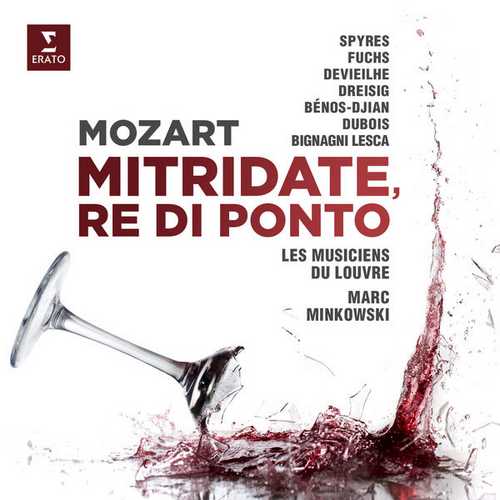

Composer: Wolfgang Amadeus Mozart
Performer: Michael Spyres, Julie Fuchs, Sabine Devieilhe, Elsa Dreisig, Paul-Antoine Bénos-Djian, Adriana Bignagni Lesca, Cyrille Dubois, Les Musiciens du Louvre
Conductor: Marc Minkowski
Format: FLAC (tracks)
Label: Erato
Catalogue: 9029661757
Release: 2021
Size: 2.8 GB
Recovery: +3%
Scan: yes
Mitridate, re di Ponto, K87
01. Overture
02. “Vieni, signor” (Arbate, Sifare)
03. “Se a me s’unisce Arbate”
04. “Al destin, che la minaccia” (Aspasia)
05. “Qual tumulto nell’alma” (Sifare)
06. “Soffre il mio cor con pace” (Sifare)
07. “Sin a quando, o regina” (Sifare, Farnace, Aspasia, Arbate)
08. “L’odio nel cor frenate” (Arbate)
09. “Principe, che facemmo!” (Farnace, Sifare, Aspasia)
10. “Nel sen mi palpita” (Aspasia)
11. “Un tale addio, germano” (Farnace, Sifare)
12. “Eccovi in un momento” (Farnace, Marzio)
13. “Venga pur, minacci e frema” (Farnace)
14. Marcia
15. “Se di lauri il crine adorno” (Mitridate)
16. “Tu mi rivedi, Arbate” (Mitridate, Ismene, Arbate)
17. “Sulla temuta destra” (Sifare, Mitridate, Farnace, Ismene)
18. “In faccia all’oggetto” (Ismene)
19. “Teme Ismene a ragion” (Mitridate, Arbate)
20. “Respira alfin, respira” (Mitridate)
21. “Quel ribelle, e quell’ingrato” (Mitridate)
22. “Questo è l’amor, Farnace” (Ismene, Farnace)
23. “Va’, l’error mio palesa” (Farnace)
24. “Perfido, ascolta” (Ismene, Mitridate)
25. “Eccomi a’ cenni tuoi” (Aspasia, Mitridate)
26. “Dille, che tema” (Mitridate)
27. “Tu, che fedel” (Mitridate)
28. “Che dirò? Che ascoltai?” (Sifare, Aspasia)
29. “Oh giorno di dolore” (Aspasia, Sifare)
30. “Non più regina” (Sifare)
31. “Lungi da te, mio bene” (Sifare)
32. “Grazie ai numi partì” (Aspasia)
33. “Nel grave tormento” (Aspasia)
34. “Qui, dove la vendetta” (Mitridate, Sifare, Farnace)
35. “Signor, son io” (Marzio, Mitridate, Sifare)
36. “Ah, giacché son tradito” (Farnace)
37. “Son reo; l’error confesso” (Farnace)
38. “E crederai, signor” (Sifare, Mitridate, Aspasia)
39. “Già di pietà mi spoglio” (Mitridate)
40. “Ah mia regina” (Sifare, Aspasia)
41. “Io sposa di quel mostro” (Aspasia, Sifare)
42. “Se viver non degg’io” (Sifare, Aspasia)
43. “Pera omai chi m’oltraggia” (Mitridate, Ismene)
44. “So quanto a te dispiace” (Ismene)
45. “Il tuo furore” (Aspasia, Mitridate)
46. “Mio re, t’affretta” (Arbate, Mitridate)
47. “Vado incontro al fato estremo” (Mitridate)
48. “Lagrime intempestive” (Aspasia)
49. “Ah ben ne fui presaga” (Aspasia)
50. “Che fai, regina?” (Sifare, Aspasia)
51. “Che mi val questa vita” (Sifare)
52. “Se ‘l rigor d’ingrata sorte” (Sifare)
53. “Sorte crudel” (Farnace)
54. “Teco i patti” (Marzio, Farnace)
55. “Se di regnar sei vago” (Marzio)
56. “Vadasi… Oh ciel, ma dove” (Farnace)
57. “Già dagli occhi il velo è tolto” (Farnace)
58. “Figlio, amico, non più” (Mitridate)
59. “Numi, qual nuova è questa” (Mitridate)
60. “Non si ceda al Campidoglio” (Sifare, Aspasia, Farnace, Ismene, Arbate)
You can always count on Marc Minkowski and Les Musiciens du Louvre for some serious zing, crackle and pop, and sure enough, their first momentum-filled chords to this opera penned by Mozart when he was just fourteen, punch through the air as a gloriously multi-coloured, bristling-textured musical canon ball of fiery energy; and going forwards it’s that fizzing ensemble sound – the soft rasp of the period woodwind and brass, the resiny bite of the gut strings, their technical polish, interpretational detail and exuberant joie de vivre – that’s constantly hitting you afresh. You don’t even have to wait very long for their next solo either, because their brightly ringing Act 1 March is on you before you know it.
Written in 1770 for the Teatro Regio Ducale in Milan, Mitridate, rè di Ponto is an “opera seria” centred around the historical figure of Mithridatus, King of Pontus, a ruler of Persian-Greek ancestry who opposed the Roman empire. Plot-wise, it’s a typical opera seria with its love triangles and political treachery set against the backdrop of war. Musically, the young Mozart was still learning the operatic trade and so it’s not without its flaws, but it’s impossible to argue with the utter beauty and lyricism that’s yet constantly flowing forth from its score. As for how this particular recording recording came into being, along with many of 2021’s new releases, there’s a pandemic-themed back story, because its roots were a Kabuki-inspired production Minkowski had scheduled for November 2020 at Berlin’s Staatsoper, American tenor Michael Spyres singing the title role. This ended up being Covid-cancelled.
However Erato stepped in, and Minkowski instead found himself recording it in the Philharmonie de Paris, still with Spyres in the title role, but with travel restrictions now necessitating a mostly French cast. Which, let’s face it, could hardly be seen as a hardship when it gives you such voices as Julie Fuchs, Sabine Devieilhe and Elsa Dreisig in the opera’s three-star soprano roles: Fuchs sings Aspasia, betrothed to Mitridate; Devieilhe sings the Parthian princess Ismene; Dreisig sings the king’s son Sifare – originally sung by a castrato – while the king’s other son is taken by countertenor Paul-Antoine Bénos-Dijian. Tenor Cyrille Dubois and mezzo-soprano Adriana Bignani Lesca complete the cast.Stick a pin anywhere you like in the running order and you’ll hit on a highlight.
Take Fuchs’ first aria, the coloratura showpiece, “Al destin, che la minaccia”; because who cares that the inexperienced Mozart’s fierce music is rather at odds with this being an aria in which she’s pleading protection from Dreisig’s Sifare, when it’s so brimming over with vivacious passion, and dispatched with a technical command that makes the writing’s fiendish vocal acrobatics sound as easy as falling off a log. Or how about Dreisig’s velvety softness in “Lungi da te” as obligato horn weaves about her. Or the light, silvery purity Devieilhe brings to “In faccia all’oggetto”. Indeed the casting of these three roles couldn’t have been more fitting, each voice fitting its role like a glove. I haven’t even mentioned Spyres yet, but his own combination of technical control, tonal beauty and expressiveness is equally enjoyable.This one really does have everything you could wish for in an opera recording: edge-of-the-seat dramatic sparkle, ravishing beauty, an on-fire orchestra, and a complement of voices you could listen to all day.